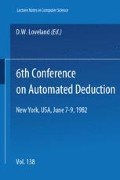Abstract
A First Order Database is defined as a function-free First-Order Theory in which the ground units serve as the Extensional Database and the proper non-logical axioms serve as the Intensional Database. This paper addresses the following problem: “Given a recursive non-logical axiom and a theorem to be proved which interacts with this axiom, can we describe a set of finite retrieval requests such that all and only the correct proofs to the theorem are found”. Our solution uses resolution-proof techniques over connection graphs to derive a program of retrieval requests from the Extensional Database that gives all the answers to a query and has a well-defined termination condition.
Preview
Unable to display preview. Download preview PDF.
References
A. Aho and J. Ullman, “The Theory of Parsing, Translation, and Compiling, Vol. 1: Parsing,” Prentice-Hall, Englewood Cliffs, N.J., 1972.
C. Chang, “On Evaluation of Queries Containing Derived Relations in a Relational Data Base,” Workshop on Formal Basis for Databases, Toulouse, France, 1979.
L. Henshen, S. Naqvi, “On Compiling Queries in Recursive First-Order Databases”, submitted to JACM.
R. Reiter, “Deductive Question Answering on Relational Data Bases,” in Logic and Data Bases (ed. H. Gallaire and J. Minker), Plenum Press, 1978.
R. Reiter, “Equality and Domain Closure for First-Order Data Bases,” Journal of the ACM, Vol. 27, No. 2, 1980.
J. Robinson, “A Machine-Oriented Logic Based on the Resolution Principle,” Journal of the ACM, Vol. 12, No. 1, 1965.
S. Shapiro, and D. McKay, “Inference with Recursive Rules,” Proc. NCAI, Stanford University, 1980.
S. Sickel, “A Search Technique for Clause Interconnectivity Graphs,” IEEE transactions on computers, Vol. C-25, No. 8, 1976.
J. Ullman, “Principles of Data Base Systems,” Computer Science Press, Potomac, Md., 1980.
Author information
Authors and Affiliations
Editor information
Rights and permissions
Copyright information
© 1982 Springer-Verlag Berlin Heidelberg
About this paper
Cite this paper
Henschen, L.J., Naqvi, S.A. (1982). Representing infinite sequences of resolvents in recursive First-Order Horn Databases. In: Loveland, D.W. (eds) 6th Conference on Automated Deduction. CADE 1982. Lecture Notes in Computer Science, vol 138. Springer, Berlin, Heidelberg. https://doi.org/10.1007/BFb0000069
Download citation
DOI: https://doi.org/10.1007/BFb0000069
Published:
Publisher Name: Springer, Berlin, Heidelberg
Print ISBN: 978-3-540-11558-8
Online ISBN: 978-3-540-39240-8
eBook Packages: Springer Book Archive

